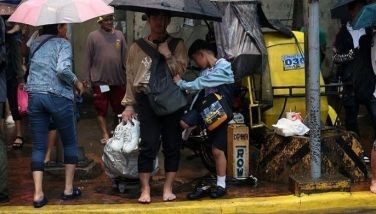GMA wants VAT law passed by Apr. 30
April 17, 2005 | 12:00am
President Arroyo said yesterday she expects to sign into law a value-added tax (VAT) bill "with a higher rate and wider scope" by April 30.
The President cited Congress’ delay in passing the tax measure as the reason why the Japan Credit Rating Agency (JCRA) downgraded the Philippines’ sovereign rating by one notch.
With this, Mrs. Arroyo called on members of the bicameral conference committee to speed up the reconciliation of the House and Senate versions of the VAT bill.
She said the JCRA downgrade, which came amid concerns over delays in addressing the country’s fiscal reforms, "is telling us that all of our reforms are not moving fast enough."
"So I hope that the bicameral conference committee on the VAT will come out with a VAT structure with a higher rate and wider scope which will bring in P60 billion of the P80 billion that we need for our entire fiscal reform program," the President said in a speech in Iloilo last Friday.
To complement the VAT law, Mrs. Arroyo vowed to pursue a vigorous drive against corruption and wasteful spending in government. She added measures like the four-day workweek would also help the government save money.
After the VAT bill has been signed into law, the President said she would next concentrate on power sector reforms and other programs of her 10-point agenda.
Despite points of disagreement, House and Senate panels say there is no stalemate in the bicameral conference on the VAT bill as talks began Friday. Formal meetings will begin tomorrow.
House leaders expressed confidence that with the expected passage of the VAT bill this month, the Philippines’ credit rating will be upgraded.
Enacting the expanded VAT measure into law "would convince rating agencies to improve" their credit grading for the country, said Tarlac Rep. Jesli Lapus, chairman of the ways and means committee.
"We’ve shown them our seriousness toward reforms to address the deficit problem," he said.
Like Lapus, Davao City Rep. Vincent Garcia believes the Malacañang-backed tax measure will have a "positive impact" on the country’s economy.
"Our patience in waiting for the E-VAT (expanded VAT) enactment will soon bear fruit," Garcia said, noting that despite the one-notch downgrade by JCRA, the country still "managed to upgrade its investment outlook to stable from negative."
And this "reflects the country’s comparatively stable macroeconomic performance," Garcia stressed.
JCRA gave the country a BBB- grade. BBB means an adequate level of capacity to honor the financial commitment on the obligation. However, this capacity is more likely to diminish in the future than in the cases of higher rating categories.
Nonetheless, Garcia said Congress is "gratified by the fair assessment."
"The outlook validates the sound economic policies of President Arroyo," he said.
According to Garcia, the E-VAT’s enactment into law will boost the Philippines’ image before the international financial community, which he said "has been waiting for the completion of the government’s urgent fiscal agenda."
Lapus shared this view, predicting that the JCRA along with other credit rating agencies likes Moody’s Investors Service, Fitch Ratings and Standard and Poor will "all upgrade the country’s rating" once the administration’s fiscal reform program is concluded.
The VAT reform bill is the last of six revenue-generating measures pushed by Malacañang to address the fiscal woes of the cash-strapped government and prevent further credit-rating downgrades that increase the country’s indebtedness.
Contentious issues were being tackled in the bicameral conference with the hope of reconciling differences in the Senate and House versions of the amendments to the VAT bill.
The issues include the percentage rate, exemptions and the "no pass-on" policy that would block power producers from passing on increased rates to consumers.
Meanwhile, Sen. Richard Gordon said he would push for the continued exemption of domestic airlines from the VAT measure because of its potential adverse impact on the tourism industry.
Gordon said the Senate version of the E-VAT includes a provision to lift the exemption of domestic airlines from the VAT coupled with the removal of the two-percent franchise tax currently imposed on them.
"VAT on domestic airlines will hurt the tourism industry," the senator said, as it would result in an increase in fares.
He pointed out that "a thriving tourism industry equates to an increase in the demands for services and products which translate to more job opportunities and more revenue for the government." — With Delon Porcalla, Marvin Sy
The President cited Congress’ delay in passing the tax measure as the reason why the Japan Credit Rating Agency (JCRA) downgraded the Philippines’ sovereign rating by one notch.
With this, Mrs. Arroyo called on members of the bicameral conference committee to speed up the reconciliation of the House and Senate versions of the VAT bill.
She said the JCRA downgrade, which came amid concerns over delays in addressing the country’s fiscal reforms, "is telling us that all of our reforms are not moving fast enough."
"So I hope that the bicameral conference committee on the VAT will come out with a VAT structure with a higher rate and wider scope which will bring in P60 billion of the P80 billion that we need for our entire fiscal reform program," the President said in a speech in Iloilo last Friday.
To complement the VAT law, Mrs. Arroyo vowed to pursue a vigorous drive against corruption and wasteful spending in government. She added measures like the four-day workweek would also help the government save money.
After the VAT bill has been signed into law, the President said she would next concentrate on power sector reforms and other programs of her 10-point agenda.
Despite points of disagreement, House and Senate panels say there is no stalemate in the bicameral conference on the VAT bill as talks began Friday. Formal meetings will begin tomorrow.
House leaders expressed confidence that with the expected passage of the VAT bill this month, the Philippines’ credit rating will be upgraded.
Enacting the expanded VAT measure into law "would convince rating agencies to improve" their credit grading for the country, said Tarlac Rep. Jesli Lapus, chairman of the ways and means committee.
"We’ve shown them our seriousness toward reforms to address the deficit problem," he said.
Like Lapus, Davao City Rep. Vincent Garcia believes the Malacañang-backed tax measure will have a "positive impact" on the country’s economy.
"Our patience in waiting for the E-VAT (expanded VAT) enactment will soon bear fruit," Garcia said, noting that despite the one-notch downgrade by JCRA, the country still "managed to upgrade its investment outlook to stable from negative."
And this "reflects the country’s comparatively stable macroeconomic performance," Garcia stressed.
JCRA gave the country a BBB- grade. BBB means an adequate level of capacity to honor the financial commitment on the obligation. However, this capacity is more likely to diminish in the future than in the cases of higher rating categories.
Nonetheless, Garcia said Congress is "gratified by the fair assessment."
"The outlook validates the sound economic policies of President Arroyo," he said.
According to Garcia, the E-VAT’s enactment into law will boost the Philippines’ image before the international financial community, which he said "has been waiting for the completion of the government’s urgent fiscal agenda."
Lapus shared this view, predicting that the JCRA along with other credit rating agencies likes Moody’s Investors Service, Fitch Ratings and Standard and Poor will "all upgrade the country’s rating" once the administration’s fiscal reform program is concluded.
The VAT reform bill is the last of six revenue-generating measures pushed by Malacañang to address the fiscal woes of the cash-strapped government and prevent further credit-rating downgrades that increase the country’s indebtedness.
Contentious issues were being tackled in the bicameral conference with the hope of reconciling differences in the Senate and House versions of the amendments to the VAT bill.
The issues include the percentage rate, exemptions and the "no pass-on" policy that would block power producers from passing on increased rates to consumers.
Meanwhile, Sen. Richard Gordon said he would push for the continued exemption of domestic airlines from the VAT measure because of its potential adverse impact on the tourism industry.
Gordon said the Senate version of the E-VAT includes a provision to lift the exemption of domestic airlines from the VAT coupled with the removal of the two-percent franchise tax currently imposed on them.
"VAT on domestic airlines will hurt the tourism industry," the senator said, as it would result in an increase in fares.
He pointed out that "a thriving tourism industry equates to an increase in the demands for services and products which translate to more job opportunities and more revenue for the government." — With Delon Porcalla, Marvin Sy
BrandSpace Articles
<
>
- Latest
- Trending
Trending
Latest
Trending
Latest
Recommended




























